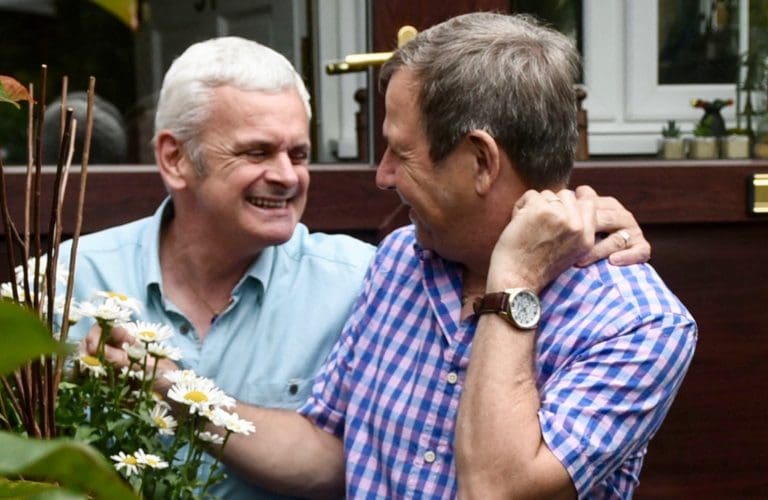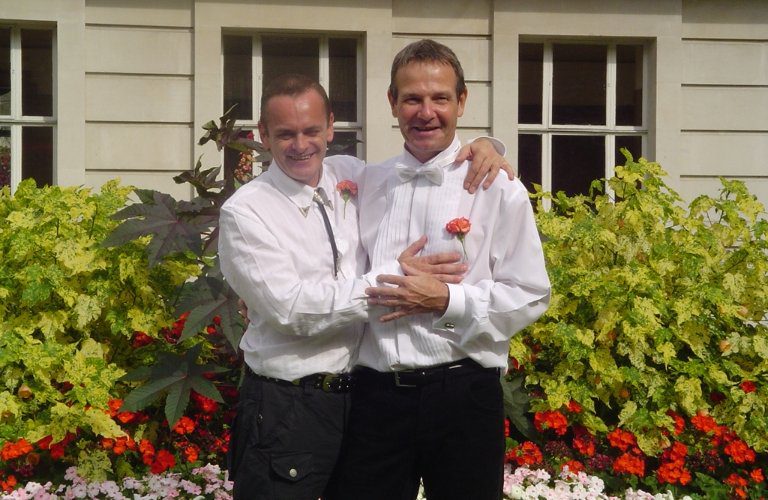Mike and Tom’s story: “I couldn’t find any LGBT+ dementia services – so I created one
Mike and Tom’s story shares the impact dementia had on their marriage, and some of the unique challenges they faced as an LGBTQ+ couple.

Mike and Tom
I met Tom in 1975 when we were both aged 19. Back then, being an ‘out’ gay person just wasn’t the thing to do. There weren’t any places for gay people to go, no roles models or anyone to even talk to.
I saw a sticker one day on the London Underground advertising a group that provided social and friendship opportunities for young gay people. I kept going up and down the escalator trying to write the number down, we didn’t have mobile phones in those days! I plucked up the courage to call and attended a tea party that weekend. Tom and I were sitting on opposite ends of the sofa. We both looked over at each other and that was it, we were together from that moment.
Tom was a loving, loyal and kind human being. I feel very lucky that I met him, we had a wonderful life together. We got married in 2016 and had a civil partnership before that.
Tom was initially diagnosed with mild cognitive impairment in 2008. He was later diagnosed with a rare form of dementia, cortical basal degeneration.
I retired from my job in the London Fire Brigade in 2014 to care for Tom as his cognitive and physical issues became more complex. Sadly, Tom passed away in September 2022, but I was able to care for him at home until the end of his life.
Language is so important
Being from the LGBTQ+ community and being faced with a dementia diagnosis has extra implications when dealing with healthcare systems. Every time we had an appointment, people made assumptions about our relationship. We were almost never accepted as a couple, despite being married.
Tom was unable to communicate for the last five years of his life, and healthcare professionals would always assume I was just Tom’s carer or another relative, never his husband.
Language is so important. It’s much better to ask, “How are you connected to Mr Hughes?” Assumptions are hurtful and made me feel that we still didn’t quite belong.
We have come a long way in recent years and the increase in awareness raising and training has been monumental. The most important thing is that the person on the receiving end feels supported and understood.
The fear of discrimination is a barrier to support
The history of the LGBTQ+ community is also important to understand and consider in the context of dementia. I was always anticipating discrimination because it was what we were used to – and this anticipation is almost as difficult as actually experiencing discrimination because it could happen at any time. It can be a barrier for LGBTQ+ people to accessing the support they need.
When Tom and I were 20 years old, we would have been arrested or beaten up for holding hands in public. But when Tom developed mobility issues, I would walk around town with his hand in mine to keep him safe.
On a couple of occasions people said offensive things to us. It was only a couple of times, but it turns your radar on and makes you question your safety.
I had huge anxiety about moving Tom to a care home. If a person living with dementia from the LGBTQ+ community has memory decline, they may still think that being gay is illegal. This causes a huge amount of distress and worry.
Fortunately, I was able to care for Tom at home until the end of his life – but not everybody has that support system.

When Tom received his dementia diagnosis, we were invited to a support group of about 30 people, and we were the only gay couple. I had to be quite brave and say, ”This is my husband.”
Everyone was accepting but what was missing was other people from the LGBT+ community who had a shared experience and history. I couldn’t find any existing services, so I created one – the LGBTQ+ Dementia Advisory Group. It was something that I needed as a carer.
The group has regular networking opportunities for people affected by dementia who identify as LGBTQ+. We also share knowledge, best practice and useful resources.
Having a dementia diagnosis and being from the LGBTQ+ community is complex and challenging. But in the group, you don’t have to explain the LGBT+ context, and you can focus on the experiences of living with dementia.
We want people from the LGBTQ+ community to know they are safe and accepted. What a gift that is.
